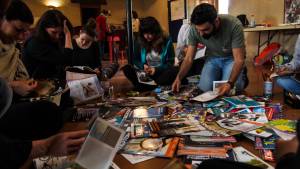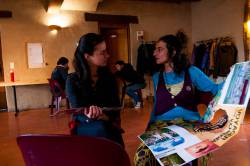User Tools
Sidebar
Table of Contents

Exploring one's lifepath through the River of Life & the Explicitation Interview
Objectives
- Allowing participants to explore their past, focusing on important moments, continuities and breakdowns;
- Revealing key moments of their life, which have an impact on their current situation, motivation, choices, beliefs and behaviors;
- Acknowledging what they learnt from each experience, highlighting their knowledge, know-how, social and soft skills;
- Strengthening participants’ active listening skills
- Bonding people through an authentic and open talk on their life course.
Scenario
Duration : 3 hours.
> Step 1 : Representing one’s life path (1 hour 15 minutes)
 Ask the participants to represent their life path in the form of a collage. Make sure you have a lot of old magazines so that the trainees can look for images and words in them as symbols of important dates / moments of their life (either professional or academic nor personal, such as studies, meetings, trips, important decisions…).
Ask the participants to represent their life path in the form of a collage. Make sure you have a lot of old magazines so that the trainees can look for images and words in them as symbols of important dates / moments of their life (either professional or academic nor personal, such as studies, meetings, trips, important decisions…).
Invite them to reveal both continuities and breakdowns, failures and successes, and to reflect on their impacts on them (from a personal, a social, or a professional point of view).
You can help them by showing an example and with some guidance, like:
What are the continuities in your habits, friends, actions? What are the breaks?
What are the events of your life that you consider as failures, as successes, and why?
What are the consequences of those moments in your personal path? In your career?
> Step 2 : Explicitation Interviews (inspired by P.Vermesch) (40 minutes x 2)
Invite the participants to gather by pair, ideally with a person they didn’t share a lot with so far or who they would like to get to know better.
 For 40 minutes each, they will lead an “explicitation interview” aiming at revealing to their partner:
For 40 minutes each, they will lead an “explicitation interview” aiming at revealing to their partner:
- the patterns they tend to repeat;
- the subtle or hidden meaning(s) of the moments / events / stages they drew;
- the impacts of these events on them;
- the knowledge, the know-how and the soft skills they acquired or strengthen thanks to them.
In practice, one will talk and try to dig in his/her own experience, the other will lead the interview, asking questions and taking notes. The interviewee will be free to talk about some of his/her experiences or not; the interviewer should pay attention to respect the interviewee’s potential silences.
After 40 minutes, they will swap roles : the interviewee will become the interviewer and vice versa.
Before the exercise starts, introduce the participants to the basics of active listening and draw their attention to the fact that the exercise is not a psychological interview (even if it may bring up emotions sometimes). The interviewer should avoid asking “why” to the interviewee. He/she have to focus on the facts and not on the judgment of what happened. This way, he/she will help the interviewee to acknowledge the skills that he/she put into practice or acquired from each specific experience he/she had, as well as the influence each experience had on him/her.
To help the participants visualize how it works, provide a few examples of the questions they may ask:
“What are the different stages of your past experiences?”
“Do they have some continuity in them or are they very different one from the other?”
“In each stage, what exactly happened?”
“What did you learn from this moment of your life? How does this influence your actions today?”
Close the session with a short debrief in plenary session on how they felt with the exercise.
Then, let them free : the exercise might have been moving and a break will be more than welcome.
Material required
- 2 A3 per person
- Numerous old magazines
- 1 pair of scissors + 1 glue stick per person
- A4 + pencils to take notes



